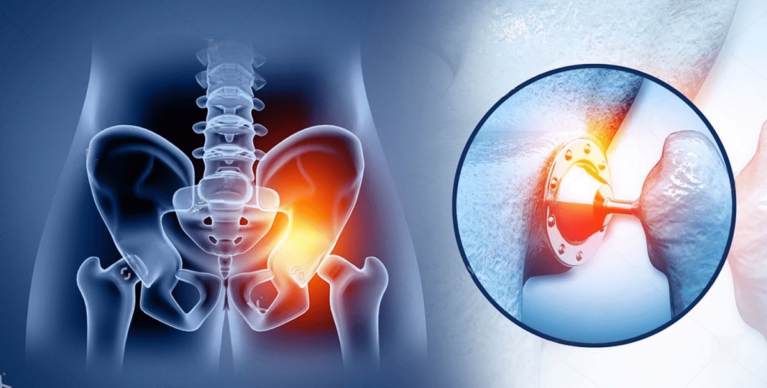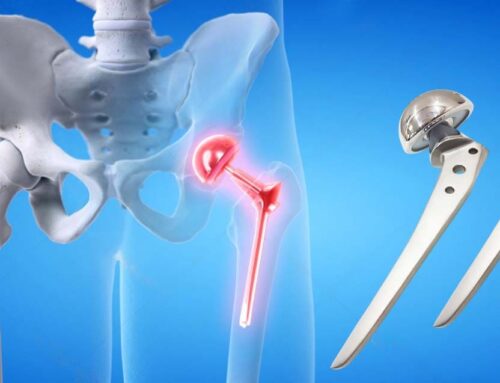Total Hip Replacement (THR), also known as hip arthroplasty, is a surgical procedure where a damaged hip joint is replaced with artificial components. This surgery is commonly performed to relieve pain and improve function in patients with severe hip joint damage due to arthritis, fractures, or other conditions.
Indications for Total Hip Replacement
- Osteoarthritis: Degenerative joint disease causing cartilage breakdown.
- Rheumatoid Arthritis: Autoimmune condition leading to joint inflammation.
- Post-Traumatic Arthritis: Arthritis following injury or fracture.
- Avascular Necrosis: Bone death due to inadequate blood supply.
- Hip Fractures: Severe fractures that are not amenable to repair.
- Developmental Dysplasia: Abnormal hip joint development from birth.
Preoperative Preparation
- Medical Evaluation: Comprehensive assessment including medical history, physical examination, and diagnostic tests (X-rays, MRI, CT scans).
- Medication Review: Adjustment or cessation of certain medications (e.g., blood thinners).
- Physical Examination: Assessment of overall health and readiness for surgery.
- Preoperative Education: Information on the procedure, risks, benefits, and postoperative care.
- Lifestyle Adjustments: Smoking cessation, weight management, and exercises to strengthen muscles around the hip.
The Procedure
- Anesthesia: General anesthesia or regional anesthesia (spinal or epidural).
- Incision: A surgical incision is made over the hip joint.
- Joint Access: The muscles and tissues are moved to expose the hip joint.
- Removal of Damaged Bone and Cartilage: The damaged femoral head is removed.
- Implantation: The acetabulum (hip socket) is prepared and the artificial cup is placed. The femoral component is then inserted into the femur.
- Reconstruction: The hip joint is reassembled with the new components.
- Closure: The incision is closed with sutures or staples.
Types of Implants
- Cemented Implants: Fixed with bone cement.
- Cementless Implants: Designed to allow bone growth onto the implant.
- Hybrid Implants: Combination of cemented and cementless components.
- Materials: Metal (titanium, stainless steel), ceramics, and polyethylene.
Postoperative Care
- Pain Management: Medications for pain relief.
- Rehabilitation: Physical therapy to restore movement and strength.
- Wound Care: Keeping the surgical site clean and dry.
- Activity Restrictions: Avoiding high-impact activities and certain movements.
- Follow-Up: Regular check-ups to monitor progress and implant status.
Recovery Timeline
- Hospital Stay: Typically 3-5 days.
- Initial Recovery: 4-6 weeks with gradual resumption of activities.
- Full Recovery: May take up to 6 months to a year.
Risks and Complications
- Infection: Risk of infection at the surgical site.
- Blood Clots: Deep vein thrombosis or pulmonary embolism.
- Dislocation: The artificial joint may dislocate.
- Leg Length Discrepancy: Difference in leg lengths post-surgery.
- Implant Loosening: Over time, the implant may become loose.
- Nerve Damage: Rare but possible damage to surrounding nerves.
Long-Term Outcomes
- Pain Relief: Significant reduction in pain.
- Improved Mobility: Enhanced ability to perform daily activities.
- Durability: Implants typically last 15-20 years, with newer materials potentially lasting longer.
Tips for a Successful Outcome
- Adhere to Rehabilitation: Follow the physical therapy regimen strictly.
- Maintain a Healthy Lifestyle: Balanced diet, regular exercise, and avoiding excessive strain on the hip.
- Regular Monitoring: Keep up with follow-up appointments to ensure implant integrity.
- Awareness of Symptoms: Report any unusual pain or symptoms to your doctor immediately.
Best orthopedic implants & Instruments Company in India
HEMC is a leading global provider of orthopedic implants and instrument set from India. With a team of skilled professionals and advanced technology, HEMC has been able to create a niche for itself in the market.
HEMC offers a wide range of implants for various orthopedic procedures including locking plates, interlocking nails, spine implants, hip prosthesis and instruments, etc. HEMC’s products are known for their precision, durability, and reliability. The company uses the latest techniques and materials to manufacture its products, ensuring that they meet the highest standards of quality.
HEMC has a strong distribution network that ensures its products reach every corner of the country. The company is committed to providing the best possible service to its customers and has a dedicated team of professionals who are always ready to assist them.
In conclusion, HEMC is a reliable and trustworthy company that provides high-quality orthopedic implants. With its focus on innovation, research, and development, the company is well-positioned to continue to lead the market for years to come.




Leave A Comment